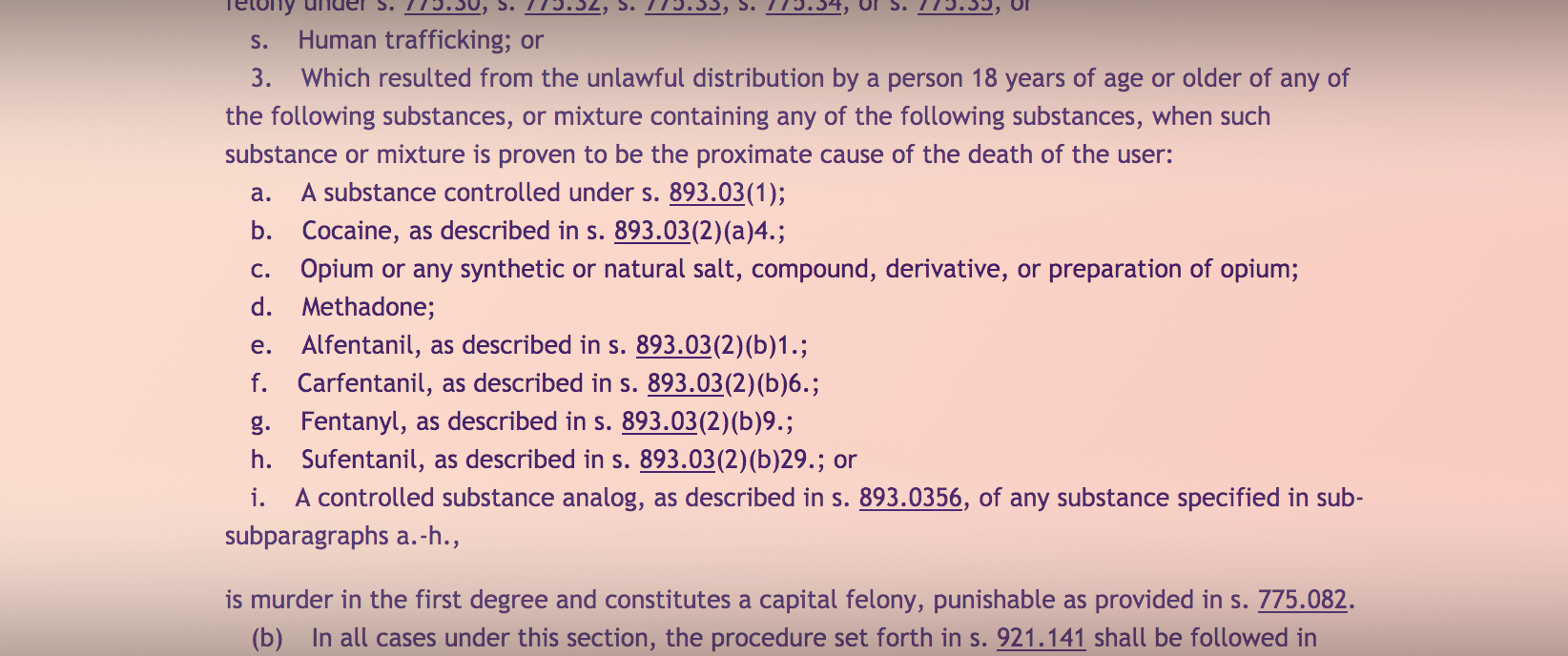Public Defender Foils Prosecutor’s Murder Charge in Drug Overdose
On April 9, a Florida public defender persuaded a judge to drop a first-degree murder case against his client related to a fentanyl overdose last fall. The case involves Christopher Toro, 30, who is accused of selling illicit fentanyl that resulted in the overdose death of 32-year-old Alfonso Pagan in September 2017. Seminole County prosecutors […]

On April 9, a Florida public defender persuaded a judge to drop a first-degree murder case against his client related to a fentanyl overdose last fall.
The case involves Christopher Toro, 30, who is accused of selling illicit fentanyl that resulted in the overdose death of 32-year-old Alfonso Pagan in September 2017. Seminole County prosecutors originally charged Toro with murder “which resulted from the unlawful distribution” of opium and its derivatives.
Seminole County attorney Nick Kramperth’s basis for the motion to dismiss his client’s murder charge was twofold: Fentanyl is a synthetic opioid — it is not made from opium — and the addition of fentanyl to the list of substances covered under Florida’s “unlawful distribution” law did not go into effect until eight days after Pagan’s overdose death.
From 2015 to 2016, Florida saw a 97 percent jump in overdose deaths linked to illicit opioids like fentanyl, and prosecutors have responded to the surge by charging alleged dealers like Toro with first-degree murder which, under the state law, is punishable by death or life in prison without parole.
Prior to October 1 of last year, however, Florida’s murder statute did not apply to the sale of fentanyl. Toro’s dismissal could potentially apply to at least eight similar cases that occurred in Florida before October 1, Jeff Dowdy, chief assistant public defender for the 18th Judicial Circuit in Florida, told In Justice Today.
Toro’s public defender, Kramperth, argued in his motion to dismiss that Florida’s murder statute stating that a death resulting from unlawful distribution of a drug only applied to “opium or any synthetic or natural salt, compound, derivative, or preparation of opium.” Fentanyl, Kramperth wrote, is not a “synthetic of opium,” as specified in the statute. Similarly, Jannet Brown, a crime analyst with the Florida Department of Law Enforcement and expert witness for the state, testified that “fentanyl is a synthetic opioid and not made from opium.” Circuit Judge Debra Nelson ruled in Toro’s favor and called the language in the statute “unambiguous,” that “fentanyl is not made from opium at all and essentially has nothing to do with opium.”
“The state attorney thought they would get creative with the statute,” Dowdy told In Justice Today. “Between the language in the statute and the legislative history, I think we’re on solid legal ground.”
Kramperth told local reporters, “[The judge] really had no choice but to grant the motion” to dismiss. “She followed the law perfectly.”
Further supporting the defense’s position is the fact that the bill signed by Florida Governor Rick Scott adding several analogues of illicit fentanyl to the murder statute didn’t take effect until eight days after Pagan died. “For some unknown reason, the state attorney started indicting people on the new statute before it took effect,” Dowdy told In Justice Today. “Their theory is the statute covered any synthetic of opium. But opium and opioids are two different types of drugs.”
In the context of drug distribution, this isn’t the first time that the wording of Florida’s statute has led to a dismissal. In 2009, William F. McCartney III’s first-degree murder charge was dismissed because he allegedly sold methadone that resulted in a man’s death. Like fentanyl, methadone is a synthetic opioid, not a “synthetic of opium,” as specified in the statute. The statute was updated in 2010 after McCartney’s case to specifically include methadone, but still did not apply to other synthetics like illicit fentanyl.
Toro’s dismissal is already affecting other cases that took place before October 1, such as Jamie Nelson, 35, who is accused of accepting $50 for taking Tracy Skornicka, then 41, to a dealer who sold her a lethal dose of illicit fentanyl on June 15. Nelson was charged by Seminole County state attorney’s office with murder simply for being a “middleman” in the deal.
In light of Toro’s dismissal, Dowdy told In Justice Today that he expects Circuit Judge Melanie Chase to dismiss Nelson’s murder charge. “But the state’s attorney made a surprising announcement in court,” he said. “They plan to get creative and charge her with ‘manslaughter by act’ instead,” a second-degree felony.
Dowdy told In Justice Today that he believes that prosecutors will also try to charge Toro with manslaughter. “It’s them being creative again,” he said, adding that he’s never seen a manslaughter charge applied to a case in which a person died from self-administering drugs and accidentally overdosing.
“Recent dismissals in these Florida cases illustrate the enormity of the stakes, as these defendants would have likely spent most of their lives in prison, if convicted,” Leo Beletsky, a drug policy researcher who has studied the application of “drug-induced homicide” laws for Northeastern University’s Law School, told In Justice Today.
“The stark difference between the rhetoric of ‘going after drug kingpins’ and the reality that these laws are being deployed to go after small-time dealers or other drug users calls for a wholesale re-examination of this approach,” Beletsky said.
